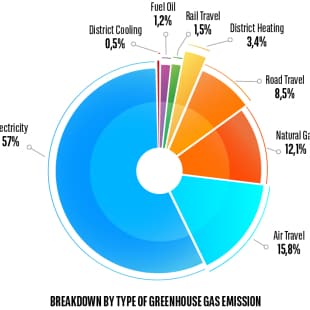Detailed and recognized reporting of the Group’s direct impacts
Comprehensive reporting of the Group’s activities has been key to measuring BNP Paribas’ direct environmental impact and achieving carbon neutrality. Through questionnaires covering the 20 countries and 85 business entities where the Group has the largest number of employees, a thorough analysis of more than 50 indicators has been completed for 90% of the BNP Paribas workforce as of 31 December, 2019 with projections for the remaining 10% of employees.
These reports allow the group to have a clear vision of its greenhouse emissions and where actions can help to reduce the Group’s footprint. As of last year, the Group’s buildings and energy consumption (including IT infrastructure) accounted for 74% of emissions, and travel for professional reasons made up the remaining 26%. However these detailed breakdowns also make it possible to have estimates for individual employees in terms of CO2 emissions, paper consumption, and recycled waste. In light of the ongoing health crisis and general changes to the way employees work, the Group is also investigating how to go further and measure impacts of remote workers not present in BNP Paribas buildings.
The quality and transparency of these reports has earned BNP Paribas ample recognition from experts in the field. The Group recieved a socre of 100/100 from sustainable investment specialists RobeccoSam for its reporting, climate strategy. It has also earned 2nd place for “Climate Performance Reporting among France’s top 40 Companies”, from an EcoAct ranking in 2019. This ranking represented a leap forward for the Group as the only bank in the top 10 and an additional ranking of 4th among companies studied worldwide.
“Since 2012, we have reduced our greenhouse gas emissions per employee by more than 27% and our paper consumption per employee by 47.8%. These reductions have allowed the Group to meet its goals for 2020 in advance. We are nevertheless pushing forward to continue improving the quality of our reporting and subsequent actions to improve our direct impact on the environment.”
Stephane Lambert, Group Environmental Reporting Officer
Implementing renewable energy and environmental management
Through this detailed reporting, BNP Paribas has been able to share with stakeholders that it had already met its 2020 targets for the reduction of greenhouse gas emissions and paper consumption by the beginning of the year. These figures are the result of more than 76,000 employees worldwide now working in offices with environmental management systems. The Group has also proven a world leader in the banking insurance sector with 22 ISO 14 001 certificates validated in 2019.
In every country where it is possible, the Group deploys active policies for energy efficient buildings and data centres. Renewable energy now accounts for 35% of total electricity purchased by the Group last year compared to 32% in 2018. The Group remains a leader throughout Europe with countries like Poland, Portugal, and the UK purchasing Green Energy certificates for their electricity needs. In the United States, for example, BNP Paribas entities have used such Green Energy certificates to cover 100% of the energy consumed.
"Bank of the West has purchased REC’s for the 2018 and 2019 years. Because we are able to obtain competitive bids for these REC’s, we have found a practical and cost effective way to offset 100% of our annual energy consumption, while ensuring that we are contributing to energy efficient projects within our core geographic footprint," explains Randy Kelly, Finance CST Support for Corporate Real Estate.
An effort led by employees and the Group’s partners
In addition to more energy efficient workspaces and IT equipment, the Group’s programmes, such as the Green Company for Employees (GC4E) initiative, work to encourage individual actions by employees that can make a difference to BNP Paribas’ overall footprint. These policies promote the use of more responsible materials and recycling practices that have seen the use of sustainable paper rise to 71.3%.
No matter the efforts undertaken by single individuals or entire buildings though, some CO2 emissions remain inevitable. To achieve and maintain its status as Carbon Neutral, BNP Paribas works with strategic partners to offset the 461 030 teqCO2 (equivalent tons of CO2) generated by work-related travel and energy usage that are not completely reduced by the use of renewable energy yet.
Through its support of programs like Wildlife Works in Kenya or environmentally-focused projects on the innovative ClimateSeed platform, which was originally developed within BNP Paribas Securities Services, the Group is able to offset residual emissions. Offsetting not only allows the group to achieve its carbon neutral status, but contributes to forest preservation, financing of schools, better water supply systems, and the improvement of local communities around the world.
To learn more about how BNP Paribas achieves carbon neutrality through its partnerships and policies, watch for further articles in our series on the Group’s direct impacts and find more about our actions in the energy transition.



